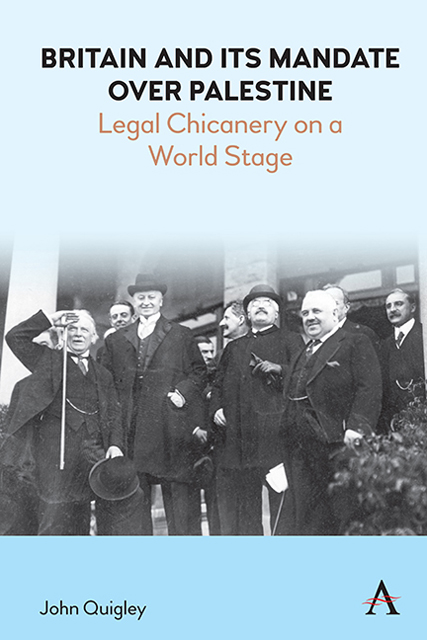Book contents
- Frontmatter
- Contents
- Preface
- Setting the Stage: Was Britain’s Rule in Palestine Legal?
- 1 The Balfour Declaration Is the Focal Point for the Legal Situation of Palestine
- 2 The Balfour Declaration Was a Binding Commitment to the Jewish People
- 3 The Jewish National Home Meant a Jewish State
- 4 The Balfour Declaration Was Issued to Affirm Jewish Rights in Palestine
- 5 The Paris Peace Conference Raised Jewish Statehood to the International Level
- 6 Britain’s Allies Made the Balfour Declaration an International Commitment
- 7 Britain’s Allies Endorsed Jewish Rights
- 8 Britain Took on Palestine Because of the League’s Mandate System
- 9 The League of Nations Protected Palestine’s Arab Population
- 10 Britain Was Given Palestine by the League of Nations
- 11 The League of Nations Put the Palestine Mandate into Legal Force
- 12 The Peace Treaty with Turkey Legalized Britain’s Status in Palestine
- 13 The Palestine Mandate Document Was a Treaty between Britain and the League
- 14 The League of Nations Required Britain to Implement the Balfour Declaration
- 15 The Palestine Mandate Document Implemented the League Covenant
- 16 The Palestine Mandate Document Recognized Jews as a National Group
- 17 The Palestine Mandate Document Bound Britain to the Balfour Declaration
- 18 The International Community Committed Itself to the Balfour Declaration
- 19 Britain Held Legal Status in Palestine
- 20 The United Nations Charter Carried Forward a Jewish Entitlement to Statehood
- Postscript: Why History Matters
- Documents Annex
- Notes
- Bibliography
- Index
10 - Britain Was Given Palestine by the League of Nations
Published online by Cambridge University Press: 10 January 2023
- Frontmatter
- Contents
- Preface
- Setting the Stage: Was Britain’s Rule in Palestine Legal?
- 1 The Balfour Declaration Is the Focal Point for the Legal Situation of Palestine
- 2 The Balfour Declaration Was a Binding Commitment to the Jewish People
- 3 The Jewish National Home Meant a Jewish State
- 4 The Balfour Declaration Was Issued to Affirm Jewish Rights in Palestine
- 5 The Paris Peace Conference Raised Jewish Statehood to the International Level
- 6 Britain’s Allies Made the Balfour Declaration an International Commitment
- 7 Britain’s Allies Endorsed Jewish Rights
- 8 Britain Took on Palestine Because of the League’s Mandate System
- 9 The League of Nations Protected Palestine’s Arab Population
- 10 Britain Was Given Palestine by the League of Nations
- 11 The League of Nations Put the Palestine Mandate into Legal Force
- 12 The Peace Treaty with Turkey Legalized Britain’s Status in Palestine
- 13 The Palestine Mandate Document Was a Treaty between Britain and the League
- 14 The League of Nations Required Britain to Implement the Balfour Declaration
- 15 The Palestine Mandate Document Implemented the League Covenant
- 16 The Palestine Mandate Document Recognized Jews as a National Group
- 17 The Palestine Mandate Document Bound Britain to the Balfour Declaration
- 18 The International Community Committed Itself to the Balfour Declaration
- 19 Britain Held Legal Status in Palestine
- 20 The United Nations Charter Carried Forward a Jewish Entitlement to Statehood
- Postscript: Why History Matters
- Documents Annex
- Notes
- Bibliography
- Index
Summary
On 24 July 1922, the Council of the League of Nations approved what was called in the Council's minutes a “declaration” about Britain's document for mandate rule in Palestine. Jerusalem Center lawyer Eugene Kontorovich took that declaration to mean that Palestine was given to Britain by the League. In a journal article coauthored with Abraham Bell, the two men wrote, “Palestine was awarded to Britain with the charge of reconstituting a national home for the Jewish people.”
“Award” implied that Palestine was somehow bestowed upon Britain. One element of the Narrative is that the League Council declaration gave Palestine to Britain. Legal scholar Elihu Lauterpacht, son of Hersch Lauterpacht, has it that on 24 July 1922, the League “granted a mandate in respect of Palestine to the British Government.”
Even analysts critical of the Palestine mandate accepted the claim that Palestine was given to Britain by the League. “The Mandate for Palestine issued by the League of Nations in July 1922,” wrote historian Rashid Khalidi, “was an internationally recognized document representing the consensus of the great powers of the day as to the disposition of the former Ottoman territory of Palestine.”
The League Council, however, never purported to give Palestine to Britain, either in the sense of giving a right to govern the territory, or a right to use the mandate system. The Allies, as we saw from the San Remo meeting, acquiesced in Britain's refusal to evacuate Palestine, but with the British Army firmly in place, there was nothing they could have done to displace it.
The League Council, moreover, had only the powers given it by the Covenant. The League had no rights over Palestine that it could bestow. The League had no authority over the territory that had been Turkey's in the Arab world. The League had no sovereignty there. Covenant Article 22, to repeat, did not give the Councl a power to distribute territory. As a result, it could not give sovereignty to Britain. Nor could it “award” a mandate, in the sense of a grant of authority to govern, because, similarly, it had no authority to give.
- Type
- Chapter
- Information
- Britain and its Mandate over PalestineLegal Chicanery on a World Stage, pp. 67 - 78Publisher: Anthem PressPrint publication year: 2022



